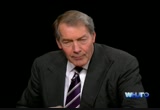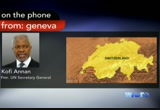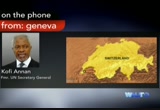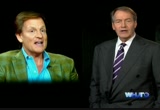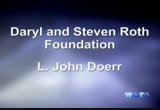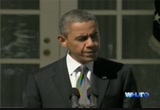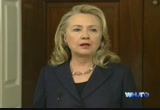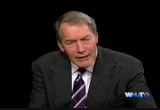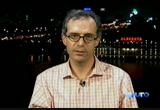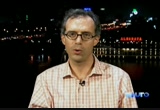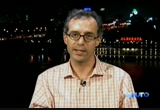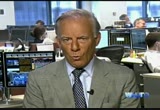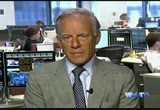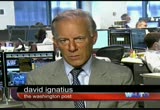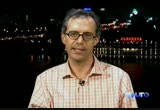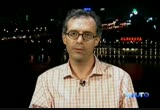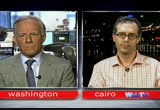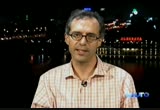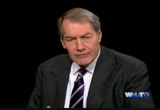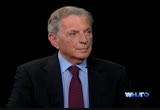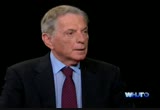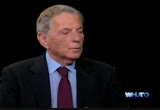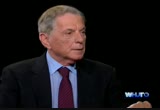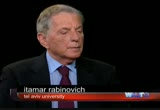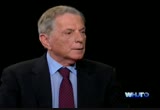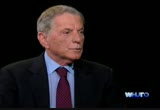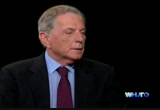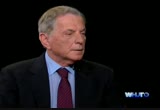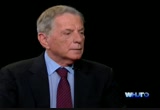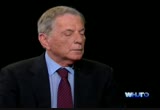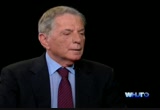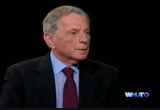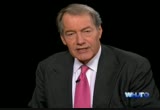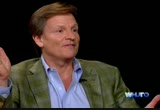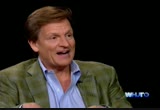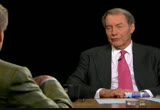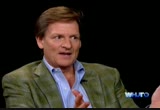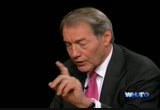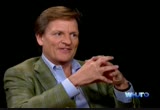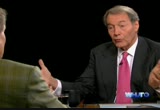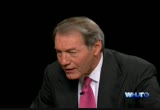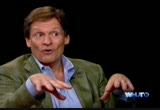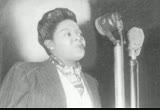tv Charlie Rose WHUT September 12, 2012 11:00pm-12:00am EDT
11:00 pm
>> rose: welcome to the program. we begin this evening with the look at the death of an ambassador after protests in libya. joining me, david kirkpatrick of the "new york times" from cairo and david ignatius of the "washington post" from washington. >> i think one of the things that may have played a role in his vulnerability is that ambassador stevens was something of a hero to the people of benghazi. he was stationed there throughout the conflict. he really provided eager and important support to the rebels who were trying to oust colonel moammar qaddafi when that fight was going on. he's somebody who's seen around town not necessarily with a heavy guard eating local food at local places, hanging out with local people.
11:01 pm
he's friends with a number of sheikhs, with many of the prominent local intellectuals. i think he had reason to believe the city of benghazi really had his back, that he was very welcome there. >> rose: continuing on the subject of libya, i talked earlier today by telephone from geneva with former secretary general of the united nations kofi annan. what should we worry about when you see the kinds of demonstrations we have seen in cairo and the more lethal consequences in libya about a response to a privately produced film that has nothing to do with america or the american government. >> i think that those kinds of incidents first of all shows that the it was how individuals can sometimes take the law into their own hands and react in a manner that we do not expect.
11:02 pm
it does require leaders to speak up. it does require leaders to send a message that this is simply not done, that it's not acceptable and one cannot have the sort of violence. and i think it also shows that the majority, the silent, peaceful majority, should speak up and the leaders should. because we live in the world of copy cat incidents and what we don't want is for others to replicate this and have it spread around and this is why sometimes i hope not only the political leaders but some of the religious leaders will speak up. >> rose: i assume you mean by that the governmental leaders and religious leaders and cultural leaders in the middle east where these kinds of protests are taking place.
11:03 pm
>> in the middle east, yes. they should really condemn the violence and they should make it clear that regardless of ones feelings, violence should not be used in defense of the koran and i they has happened in the way... i mean, we talk of extremists, we talk of also some groups and there are usually very small groups, they undertake these activities buts where the majority in? where are the leaders? nobody speaks out. >> rose: we continue with itamar rabinovich, former israeli ambassador to the united states. >> i think the components, the resolution of the iranian crisis there has to be negotiation, there has to be sanctions, there has to be a credible threat of war and there has to be a ladder to enable the regime to climb
11:04 pm
down. if you have all four elements in play then you can have a peaceful resolution to all of these. but if you look at it, i'm not happy, i should say this very clearly. i'm not happy with the way our foreign policy and doe midwest i can politics have become intertwined. i'm not happy at the rift between the prime minister and the administration. when he said we need to see red lines, secretary clinton said there are not going to be red lines. >> rose: we conclude with best selling author michael lewis talking about a new article he has in "vanity fair" about president obama. >> i thought what would be a fun piece of journalism to do? and i just had been struck through the course not just of this man's administration, this president's administration but previous ones just kind of a dysjuncture between the commentary on the outside and what it kind of seemed to me like on the inside. you talk to people who work in the white house and they all felt like sane men in an insane world. the world is swirling around
11:05 pm
them, people are constantly criticizing what they're doing and you didn't get a felt sense of what it was like to walk in the president's shoes. and journalistically have not had this that kind of sense for a long time. we just don't do that anymore. >> rose: david kirkpatrick, david ignatius, itamar rabinovich, kofi annan and michael lewis when we continue.
11:06 pm
11:07 pm
along with three other embassy staff members in rocket strikes by militants. the attack fell on the anniversary marking september 11. angry protesters had targeted the u.s. consulate after obscene clips from an american-made video mocking the prophet mohammed surfaced in the arab media. president obama condemned the violent acts in a statement from the rose garden this morning. >> there is absolutely no justification to this type of senseless violence. none. the world must stand together to unequivocally reject these brutal acts. already many libyans have joined us in doing so. and this attack will not break the bonds between the united states and libya. libyan security personnel fought back against the attackers alongside americans. libyans helped some of our diplomats find safety and they carried ambassador stevens' body to the hospital where we tragically learned that he had died. >> rose: in her remarks, secretary of state hillary clinton paid tribute to the
11:08 pm
career of ambassador stevens. >> chris stevens fell in love with the middle east as a young peace corps volunteer teaching english in morocco. he joined the foreign service, learned languages, won friends for america in distant places and made other people's hopes his own. in the early days of the libyan revolution i asked chris to be our envoy to the rebel opposition. he arrived on a cargo ship in the port of benghazi and began building our relationships with libya's revolutionaries. he risked his life to stop a tyrant, then gave his life trying to help build a better libya. the world needs more chris stevenss. i spoke with his sister ann this
11:09 pm
morning and told her that he will be remembered as a hero by many nations. >> rose: there were also demonstrations in egypt. the u.s. embassy in cairo released an apology for the inflammatory film but crowds stormed the building. joining me now from egypt, david kirkpatrick, the cairo bureau chief for the "new york times." from washington, david ignatius of the "washington post." i'm pleased to have both of them back on this program. i begin with david kirkpatrick in cairo. what do we know now about how this took place and what is going to develop next, david kirkpatrick? >> what we know is last night some time after the protests got quite out of hand here in cairo, the protests over this anti-islamic video, people started turning out in the streets in benghazi around the u.s. consulate there. and those people included one armed brigade, the islamist militia ansar al-sharia as well
11:10 pm
as other supporters. not everyone was armed. they were milling around together and then as best i'm able to understand around 9:00 at night somebody fired a rocket-propelled grenade at the gates of the consulate. and the consulate is not the kind of well fortified diplomatic outpost you might be picturing. it's basically a villa. a nice house on the outskirts of town with four security cameras on the fence, four guards two of whom are basically taking your cell phone on the way in. so it was very lightly defended and not ready for any kind of a siege. and after that, things got out of hand quite quickly. i think a number of grenades were probably fired. the protesters stormed the building and set it on fire. and then other libyans arrived, a brigade that is now doing business as the national army came and began fighting with the islamists on the other side of the compound but as far as i can
11:11 pm
tell from the people i've talked to on the scene, you know, by 10:00 or 11:00 at night the ambassador, chris stevens, was already dead along with three other americans and a few libyans from each side. >> rose: do we know why ambassador stevens was there? >> tonight he was expected to inaugurate a new cultural facility. i think one of the things that may have played a role in his vulnerability is that ambassador stevens was something of a hero to the people of benghazi. he was stationed there throughout the conflict. he really provided eager and mportant support to the rebels who were trying to oust colonel moammar qaddafi when that fight was going on. he was somebody who's seen around town, not necessarily with a heavy guard, eating local food at local places hanging out with local people, he's friends with a number of sheikhs with
11:12 pm
many of the prominent local intellectuals. i think he had reason to believe that the city of benghazi really had his back, that he was very welcomed there. so we don't know whether the people who were attacking the facility knew that he was there at the time. certainly it wasn't widely known. it's very possible they had no idea. tonight-- since you asked what's happening in the future-- there's actually a demonstration in benghazi in support of the united states. a kind of an "i'm sorry" demonstration in sympathy for what happened to ambassador stevens. >> rose: let me move to washington and david ignatius. how is the administration viewing what it can do now other than and certainly first priority make sure that other americans, embassies and consulates and american lives are protected? >> there are two fronts, charlie. on the ground in both libya and egypt the issue is the safety of
11:13 pm
american diplomats and personnel and there's really no alternative but to rely on the security forces of the libyan and egyptian governments. the u.s. has worked really hard over these last months, last year and a half to make a good relationship with the people who were now governing egypt and libya and feel that we can trust them to protect u.s. facilities and interests. there's another whole part of this which i'm sure we'll talk about, which is political. we're in the midst of a u.s. political campaign mitt romney the republican candidate issued a very sharply critical statement early today basically blasting the u.s. embassy in cairo and the obama administration behind it for issuing two conciliatory a statement and... too conciliatory a statement and that continued today with the
11:14 pm
administration responding, issuing statements of its own. and i think the political dimension may end up for american t.v. viewers, newspaper readers, overwhelming what's happening on the ground. >> rose: is there some criticism i assume, of someone who makes any kind of a political comment on this if they're... i always assume that in a political contest when there was an attack against america that it was a rally behind the president moment. >> yes, my feeling is that mitt romney may regret the very early and sharp comment that he made. this is a time when this diplomat, ambassador stevens and the others who were killed, really are american heroes and i think that will come into clearer focus as we go forward. and the idea of jumping on it-- mainly to score political points-- i think is going to leave a bad taste in people's mouths. i just would add one more thing
11:15 pm
that i'm hearing from the american sources i talked to today about what's happened in both cairo and in libya. i think although obviously anti-americanism, muslim anger about this purported video about the prophet mohammed is part of the story, a deeper part may be the effort by these more extreme so called salafist groups to go after the ruling parties. in egypt, that means going after the muslim brotherhood. it's a more extreme muslim group taking on a less extreme one because it doesn't want the muslim brotherhood government of president morsi to succeed. i think the demonstration in benghazi, from what i've been told, was pretty much a copy cat happened after what took place in cairo and people were sort of jumping, again, trying to score points again a more moderate government, a more secular government in libya that they don't like. >> rose: david, you can make... kirkpatrick, you can certainly
11:16 pm
speak to that. you're in cairo. >> yeah. well, as i understand it, when things got out of hand at the embassy it was around 6:30, it was after work. television was starting to cover the protest. and that's when the soccer fans showed up. egypt now has a large cohort of people known as ultras. they're soccer fans that really like to runable. they get together and talk games, they fight with the police, they're ready to go down any time anywhere. they've become sort of half politicize bud have no clear ideology and around 6:30 or so they joined the more islamist conservative crowd, the salfys that my colleague was talking about and that's when things got out of hand. that's when people started climbing over the walls and getting into the embassy compound here in cairo. and i think that's important. i mean, salafist demonstrations outside the u.s. embassy in egypt are very routine. i mean, they're like clockwork. and they're not usually violent.
11:17 pm
and the reason this one got out of hand is because of a very different element that joined the fray. in libya i think it's definitely too soon to know what was motivating the attackers. but, again, you're talking about an atmosphere there where the... you have a very young population, a lot of young men, and they all have guns. you know, it's hard to hold any kind of public gathering without somebody showing up with an a.k.-47 or a rocket-propelled grenade launcher in libya. it's just a very well-armed and unstable situation right now. so it's... you know, it's hard to say that necessarily that much thought went into setting this off in terms of the domestic politics. >> rose: could this have possibility of morphing into something much larger? >> yeah, i think it certainly could at this point. i don't think we know how it's going to turn out. protesters were outside the embassy here in cairo again
11:18 pm
tonight. as far as i can tell it's a small crowd and doesn't show any sign of getting out of hand. but there are people on the streets tonight, as i said, demonstrating in support of the americans and in support of ambassador stevens. will other people who were involved in last night's attack show up and try to make trouble? that's not impossible. so i think at this point it's more of a wait-and-see situation. >> rose: before this-- and this is for you first, david kirkpatrick-- what has been the ability of the united states to somehow make real connection with islamist governments who are taking power as a consequence of the arab spring? >> you know, i think that's a very hotly debated question inside the united states and perhaps even inside the gits united states government itself. in the case of egypt there's obviously been a decision that the elected government of egypt is a muslim brotherhood government, it's an islamist government, it describes its as a moderate islamist government and that's who we've got to deal with. there may have been some impatience in this instance
11:19 pm
because the u.s. government just brought a large delegation of businessmen to egypt and spent several days trying to trump up more investment in egypt and help get the economy off the ground here, show their support for egypt? the way that matters most in the country. and last night we did not hear from president mohammed morsi of the muslim brotherhood. in fact, it wasn't until today that the prime minister spoke out against what had happened at the embassy. and i don't... we still haven't heard from the head of state saying firmly and clear they this is completely inappropriate. >> rose: david, what's the fear on the part in washington? >> well, the fear is this still very unstable post-revolutionary situation-- which is what we're seeing in both egypt and libya and so many other places-- extremist forces in the vacuum of power that still exists will become ever stronger. but when you see this kind of
11:20 pm
chaos and an american ambassador getting killed and r.p.g.s being fired at the consulates suddenly you realize how quickly things could spin out of control. >> rose: thank you very much, david ignatius. thank you, david kirkpatrick for joining us. i know it's late in cairo. thank you. >> thank you, charlie. >> always a pleasure. >> rose: thank you. back in a moment. stay with us. >> rose: itamar rabinovich is here. he is the former israeli ambassadortor the united states. he also served as israel's chief negotiator with syria. yesterday israel's prime minister netanyahu sharply criticized the united states for its failure to take more decisive action in halting iran's nuclear program. >> the world tells israel "wait. there's still time." and i say "wait for what? wait until when?" those in the international
11:21 pm
community who refuse to put red lines before iran don't have a moral right to place a red light before israel. i think iran must understand there that there's a red line so they stopped a vancing on their program to produce atomic bombs. >> rose: i'm pleased to have my friend itamar rabinovich join us now. he's written extensively about the region, not only serving his government but also teaching and writing his book that was published in november called "the lingering conflict." it deals with the issues in the middle east. i want to first talk about syria and then we'll come to the question of where we are with respect to iran and israel and who might be doing what. what's going to happen there? how do you see-- knowing the syrians as you do-- this crisis? does it... does it become a stalemate or does it become something else? >> no, it cannot be a stalemate
11:22 pm
because i think bashar al-assad and his regime are doomed. it's a question of time. it may take weeks, it may take months. unfortunately, it may linger even more than that. but he's doomed. people don't realize that because the machinery of government seems to be in place. the army and the security apparatus are in place. but more than 70% of the country outside the control of the government. and more importantly, he is without a shred of legitimacy. you can be a dictator, but even a dictator needs legitimacy. his father, the builder of modern syria, was obviously a dictator but he enjoyed legitimacy. bashar managed to lose it. so he can hang on with his fingernails to the cropings of power but he will lose it at the end. what will happen then is still an open question. >> rose: was there something that someone like bashar could have done early on recognizing that the arab spring was coming?
11:23 pm
are there moments in which people make decisions that forever decide the inevitable future they will face? >> he could have done it... when he came in in 2000, when he succeeded his father, he began something known as the damascus spring and was then told by his father's henchmen that you don't open pandora boxes. and he shut the pandora box. then came the arab spring and he gave a famous-- or you can say notorious-- "wall street journal" interview in january, 2011, in which he said "this cannot happen in syria because we are opposing the united states and israel. we have legitimacy and what happened in egypt cannot happen here." and when it broke out finally, he should have offered reforms. >> rose: and so does he have a choice now other than fight to the end? >> i think that if he offered to the international community to
11:24 pm
leave in return for let's stay an acceptable or reasonable arrangement and, of course, immunity from prosecution in return for saving thousands or scores of thousands of lives, i think you can negotiate. >> rose: are we missing something here? some people have said to me-- including the king of jordan-- "you've got to speak to the alawites who are his last remaining support." >> that is true and that is being tried. i know that the american diplomat and others are trying to talk to the alawites and actually to draw the lesson of iraq because we touched on the issue of what's going to happen in syria afterwards and one of the lessons of iraq is that if you do not just decapitate the regime but you destroy it totally you can create anarchy. the country goes to pieces. and the idea would be for part of the leadership of the army, part of the ma machinery of
11:25 pm
government and part of the opposition to link up at least a transitional arrangement that would enable the country to step away from the abyss. so that's being tried so far unsuccessfully. >> rose: what kind of fear is there that somehow these chemical weapons may fall in the wrong hands? >> serious fear. bashar al-assad demonstrated in the past that he sometimes doesn't know... doesn't have these red lines, for instance when he tried to build a nuclear bomb with north korean help. that shows a basic lack of judgment, so i'm afraid that you may develop a syndrome when the end comes near and then he may send the chemical weapons to the wrong hands, to hazard, or he can use them against his people or against others that i think is one of the nightmare scenarios that people have with regard to syria.
11:26 pm
>> rose: where are they now, though? you know the country and you know what military people tell you as well. are they safe today? could someone steal them? >> well, "safe is a relative term but they are in the hands of the army and quote/unquote they are safe. but overnight this could change and they could become unsafe. deliberately or not deliberately. >> rose: so there is a need for the united states to exert some... >> leadership. i'm not saying to intervene militarily. i'm not sure that this is necessary. but somebody has to lead the effort to bring this crisis to an end and the united states is not doing that. it's paralyzed by, i think, primarily by the coming elections but also by fear of the unknown. i think one of the components of current crisis is that the opposition did not manage to project a unified front, a coherent alternative so people
11:27 pm
ask themselves if it's going to be replaced by petition, islamist takeover. and there are fear of what people once used to call the devil we don't know. >> rose: exactly. but there's also some people who are calling for a big international agreement as to how to handle this and it should include anybody who has a stake in this so that if, in fact, it spiral sbs into a situation worse than now everybody won't come in to try to protect their own interests. >> well, you have primarily russia, also china and also iran involved in this. i'm afraid that an agreement that would involve these three countries with the western countries, it's not workable. i think the russians don't want to see a repetition of what happened in libya when a country that once was theirs is now... it's tough to say after what happened last night but fall into western hands.
11:28 pm
the chinese are very much worried. i just came back from china and syria was on the able to in in m of my conversations. they don't like the principals that the international community met with in the affairs of... meddling in the affairs of an authoritarian country and they're afraid it will be a precedent that applies to them. so it's very difficult to see how out of all of this somebody orchestrates a coordinated international effort. >> rose: so what motivate it is russians? >> mostly sort of... it's not if full-fledged cold war but it's competition to the united states. it's a sense that, the united states may not be an enemy but it's a zero-sum concept of this crisis. >> rose: let me turn to this. this is the "new york times" today. "israel leader stiffens call for u.s. to set iran trigger. netanyahu presses white house to say what nuclear limit merits attacks.
11:29 pm
israel blasts u.s. over iran, netanyahu says obama administration has no moral right to restrain the jewish state." what's going on with the prime minister? is he trying to set the stage for what will be an attack? or is he trying to influence as he has done before the public debate? >> i think he would rather not have an attack and i think the sense is that if the united states sets red lines then an attack may not be necessary. >> rose: meaning the attack will not be necessary for israel. if the red line is set... the red lines the israelis agree with then they're prepared in a sense to let someone else do it if it becomes necessary to do it. >> well, the sense is that if... i think there are four components to a resolution of the iranian crisis. there has to be an a negotiation there has to be sanctions, there has to be a credible threat of war and there has to be a ladder to enable the regime to climb down. if you have all four elements in
11:30 pm
play then you can have a peaceful resolution to all of this. but if you look at it... i'm not happy, i should say that very clearly. i'm not happy with the way our foreign policy and your domestic politics have become intertwined. i'm not happy at the rift between the prime minister and the administration. and, you know, when he said "we need to see red lines" secretary clinton said "there are not going to be red lines." >> rose: but his press conference was in response to secretary clinton saying that. >> yeah, but it's been said on both sides. >> rose: exactly. >> and in stark opposition to one another and as an israeli who would rather not see military action i'd like to see diplomatic resolution. >> rose: and how do you think the feeling in israel is about military action? wouldn't you think majority of people would like to see it? or do you think they believe there is a red line that may be soon apparent? >> well, they certainly would not like to see it now because now it's become so intertwined with the american presidential
11:31 pm
election that there is a feeling that it would be wrong to do that before the american elections. but... and i think the israeli public is willing to give leeway for a few more months but it needs to see action happening. and if you look at it from, let's say, an israeli point of view, you see sanctions that have gaping holes in them you see negotiations that were conducted in a very slow pace, a snail's pace, and now are not being conducted at all and you ask yourself is anybody going to do something about it rohr we gradually going to drift into a situation where iran has the bomb? if that turns out to be the case over the next few months i think supporting n israel for an attack will increase. >> rose: is there any doubt in israel on the part of the prime minister and the people in israel that the united states is firm in its notion that iran cannot have a nuclear weapon and that they will do something to prevent that? do israelis believe that? >> no, they don't quite believe
11:32 pm
that for two reasons. one is that when you say the united states, what president? today's president may not be the president next spring. >> rose: but it's today's president who has said, in fact, that. that he will not stand by and let iran get a nuclear weapon. he has said that publicly and he also said he does not believe in a policy of containment. >> in prevention. >> rose: nor does he disagree with the policy that it may become necessary to take military action. >> that's s true. but the critics of the president in israel say the statements are great but we are looking for the action that matches the statements. >> rose: what action do they want? >> serious real, real crippling sanctions. >> rose: and you believe sanctions can work? >> there's diplomacy, sanctions, credible threat of war and a political ladder for the iranian government to step down without being humiliated. you need all four. >> rose: do you believe something that l happen that will not require military
11:33 pm
action? >> i think it's a distinct possibility. i won't say with any certainty that war will be averted but i think war can be averted. >> rose: you spent a lot of time thinking about negotiations between israel and arab countries, including syria, but also the palestinians. that seems to be going nowhere. >> right now. it's not a lost cause. right now, of course,, the agenda is occupied iran, occupied syria, the palestinians and the arab spring in general. the palestinians have been shoved aside. but the issue is not going to go away. it's not just a question of violence or opposition. first and foremost it's a demographic issue. israelis like myself believe we need to solve the palestinian issue and have a two-state solution for our own sake. >> rose: is that option slipping away? >> it is slipping away but it hasn't slipped away yet, this
11:34 pm
time. and there are various channels in which there's an effort to repair there, to create... to challenge between the israelis and palestinians, i've participated in a couple and i think we still have time. not a lot, but we still have some time. >> rose: it's good to have you with us. thank you. >> thank you. >> rose: back in a moment. stay with us. >> rose: michael lewis is here. he is a best-selling author, he is a journalist, he is many things. his talent for narrative lies in capturing his character's thought process. president obama is his latest subject. over six months he had the rare opportunity to speak with and observe the president. the interviews took place in a variety of locations-- air force one, oval office and, of course, on a basketball court. his profile is in the october issue of "vanity fair" magazine. it's called "obama's way." i am pleased to have michael lewis back at this table. welcome. >> thank you, charlie. >> rose: "boomerang" is out in
11:35 pm
paper back. we should say that to give credit to credit. how did this come about? why you? >> that's a great question. i didn't want to ask him that because i was afraid he might have second thought btss about it. >> rose: right, right. >> here's what happened. last november i was just coming off the book tour for "boomerang" and i knew i had to write a screenplay in the next six months and i didn't have time to write it into a book. i thought what would be a fun piece of journalism to do? i'd been struck through the course of not just this president's administration but previous ones just kind of a dysjuncture between the commentary on the outside and what it kind of seemed to be like on the inside. you talk to people who work in the white house and they all felt like sane men in an insane world. the world is swirling around them, people are constantly criticizing what they're doing and you didn't get a felt sense of what it was like to walk in the president's shoes. and journalistically have not had that kind of sense for a
11:36 pm
long time. we just don't do that anymore. so i wrote an e-mail to jay carney. >> rose: because they don't give you access. >> they don't give you access, that's true. so i wrote an e-mail to press secretary jay carney and said, look, there's an old-fashioned kind of journalism that really should be done again and i sent him an example of it. john heresy, the famous new yorker writer had done this series with truman and it's wonderful. you pit it down and you say "i know this man and i understand the job and i can understand the constraints of the job and the powers of the job and all that." the job has changed, different guy and i said, you know, there's an opportunity to do this again. are you interestd? and i kind of thought i would get laughed out of the room. i didn't think that it was going to come to anything. i got called the next day and he said... >> rose: "he" being jay carney? >> jay carney saying "we're interested in doing this." >> i said "who's we?"
11:37 pm
he said "the president is interested in doing this." i said "that's kind of great, what about everybody else at the white house?" he said "we're not very interested in doing it." (laughter) so he said i don't know, he said jay was... jay was interested in it, he's a journalist, he knew what i was getting at. he said come on in and just meet some people and we'll see if we can assuage people's nerves about this. and it wasn't to meet the president it was just to meet the powers that be around him. and so i went in and did what amounted to like a goldman sachs job interview, meeting all the honchos and i went from room to room to room in the course of the day and at the end of it... it was interesting... >> rose: what was their worry? >> i think they just wanted to see who i was. because nobody was saying "what are you going to write?" except very broadly i said this thing i want to do is at least as much about the presidency as it is about the president. i wanted to put a reader in his shoes. because i think an awful lot of the problems we have in discussing our president is we
11:38 pm
don't think about what it's like to be him. with the constraints of his decision making, those sorts of things. and so that was it. at the end of this day i was in five minutes into the last interview and a woman from the press office bursts in and says "michael, you have to leave now." and i thought what have i done? i thought they were throwing me out of the white house or something had happened. that was the tone of it. she didn't say a word, she marched me around the white house, i was disoriented, we burst through a door and i'm in the oval office and it's obama. and he was... he was waiting for everybody else to just get comfortable and he never... from that moment on we just sat down and talked. he never asked me "what are you doing?" >> rose: what do you want to do? >> what do you want to do? he kind of got it, he kind of got what i was after and he understood that for me to write what i wanted to write i had to get to know him. it's hard to get... for the president to let anyone get to know you because of the time constraints.
11:39 pm
it took eight months and i went in and out and in and out and i flew around with him, went to south america with him. >> rose: how many hours do you think you had with him? >> many, many, many, many, many hours. because what they would do is when he would travel they would give me essentially a staff pin and so i could just sit at his elbow wherever he went. so many hours of that. but sitting down just the two of us? i don't know. six? seven. maybe more. a lot. and he put me in the back of his limousine in the motorcade or he put me... there are these nooks and crannys in presidential life. air force one, when he's on air force one and there's down time, there's no one there to take it from him so he would grab me and take me up to the front. and so i just structured a... i kind of structured a relationship, it was a feat of journalism. i gave a list of things i wanted to do with him, like play basketball and so on and so forth and they did it. it was beautifully simple. and the only constraint on-- and
11:40 pm
the reader deserves to know this-- on the whole project was they had to approve quotes. so when i was done writing what i wrote-- 15,000 words-- i sent six pages of quotes into the white house and they came back and did almost nothing to them. i mean, it had no... so it was kind of clean. and fun. it was a total gas. >> rose: in your judgment is this a laudatory profile or how would you describe it? >> you can't help but like the guy. i mean, this is... >> rose: wow couldn't help but like him so therefore that would come through. >> yeah, that comes through. but he's... i think more importantly in describing the constraints of the job you become more sympathetic with the... >> rose: i want to stay away from the job for a moment. tell me what you learned. all of a sunday you wanted to see, you wanted to be there and figure out what it was like to be in his shoes. what did you learn about first him, him.
11:41 pm
>> right. so first two traits at the top of the list. just very pronounced in him. one is the competitiveness. two is self-discipline. incredible, incredible self-discipline. breathtaking kind of self-discipline. and what's odd about it is that, as he says at one point, that's not who who i am exactly. i was born this kid inly hi and i was loosey goosey. and when you're with him it feels natural, loosey goosey easy. but breathtaking self-regulation. and an ability to-- though he was a natural person-- constrain himself in unnatural ways for the sake of some purpose. so in this job he recognized pretty quickly that some very, very large part of the job is simply creating an environment in which you maximize the likelihood that you're going to
11:42 pm
make good decisions rather than bad ones. so he structured the environment where, for example, that if you... the simple pact of making decisions degrades your ability to make future ones. >> rose: so small decisions... >> got rid of all. >> rose: so he has two suits, a black and a blue suit. >> same shirt, same shoes. it's... he's very routinized in the way he structured his day. even though it's unnatural and he doesn't like it. >> rose: where was the discipline? the discipline is he that he works out everyday and one day does aerobics and other day does weights? >> it much beyond... that is true. but i think there are layers of it. but the thing that's most interesting to me is the emotional discipline. that he... he's a naturally empathic guy. >> rose: he's empathetic? >> yes, he responds. he's listening and responding. maybe not quite like clinton but when he's in a room with the parents of a dead soldier or a kid who's... a make-a-wish kid
11:43 pm
who's going to die in two weeks. he's there and he's feeling things and he has this unbelievable ability now to compartmentalize and he'll go from 20 different things a day, each one is a different emotional experience and he'll switch in and switch out and he just kind of... it's a willfulness about what he will allow himself to feel in a moment. so that's an example. another example. he's a writer. he's the most literary president we've had since lincoln. no competition. >> rose: who's in second place? >> who's in third place? >> rose: well, you said since lincoln so... >> well, j.f.k. had people write his books for him. f.d.r. had interesting expenses. teddy roosevelt wrote reasonably well but lincoln... i mean, the last time someone could write like this... >> rose: you're basing this on one book. >> no, not just one book.
11:44 pm
>> rose: what are you basing it on? >> speeches. >> rose: how do you know who writes speeches? they all begin... >> oh, no, no, no. >> rose: you tell me then. >> there are several speeches that no one else has touched of his. the race speech. >> rose: okay, that's clear. >> that was an amazing speech. >> rose: very amazing. >> his nobel prize winning speech which i get into here. >> rose: fair enough. so i agree with you that. 's what i wanted to know. >> one book is still one book! the cairo speech. >> rose: went to cairo on december 4 and made a big speech about being inclusive. >> so let's go back to the one book. the one book is a real book! that's not a political book. that's not a book you write if you think you're going to be president. >> rose: but it's a book that reflects ideas that you've been thinking about all your life you know? about your father's dreams and thinking about that. >> but it's a narrative. a story. there are places where you want to take a red pencil and cut some of it. but it's a good book. >> rose: his story. his story. >> the second is more of a
11:45 pm
political book but the first one is a neat thing. there's an honesty there. there's a guy going into a room with a piece of paper and a pencil and actually having revelations to himself. and you can see it on the page. and i talked to... so this is getting a little bit off the subject of his discipline but i'll get back to it. the... he woke up intellectually pretty late in life. he was an indifferent high school student. he discovered the love of learning and reading late in high school. a late bloomer. and had ambitions to be a writer. he wrote short stories and he would submit them to kind of literary reviews. and he was telling me about what they were vabt. he graduated tord old people as subjects. he's interested in old people. >> rose: his grandmother was the
11:46 pm
influential person... >> that's probably right. he's raised by old people and he has an old soul. >> rose: what does that expression mean? >> he take a long view of things. it's like he's slow to... he's not... if he was an investor he'd be warren buffet. long-term investor. he's got a longer view but i think it's true to say that if any of those short stories had been accepted by literary magazines he wouldn't be president. he'd be off making a living. he would have... that's the direction he would have gone if he'd been more encouraged that way. so back to discipline. this... so you're president of the united states. you have a very long and arduous day. you discover your speech writers have given you an actually kind of acceptable nobel peace prize acceptance speech but actually isn't exactly what you want to say. it is 6:00 in the evening before
11:47 pm
you have to get on the plane the next day to go to oslo and give the speech. he goes into a room, locks the door and handwrites out a 40- minute speech that finishes at 4:00 in the morning. >> rose: why handwrite it? >> i actually got ahold of the draft. i was seeing how he was working and what he does is he took his speech writer's grab and copied it and threw it away then organized his own thoughts and it was a completely original thing. the next morning they wake up and he hands them the thing. and that's lard to do. i know... i've written a lot... i'm considered fast in the writing business. >> rose: right. >> i can't go into a room and la v to generate something that quickly without knowing... i take days to get to that point. that he's able to kind of engage that way in his mind, that's interesting to me. it's hard to do. although all the... the only people i could know who could do
11:48 pm
that is english. christopher hitchens could do it. he would do it cink drinking. >> rose: and would often come home drunk and do it. >> but it's a very unusual quality. >> rose: how about the intelligen aspect of all that? i mean, how do... >> how does his mind work? >> rose: yeah. >> so his mind is... it's... in a way it's kind of... you recognize the smart lawyer and it's very kind of a clean and analytical mind. the thing that interests me about him as a character is how many unlike things get shoved together. that he is on the one hand very clean and analytical but he's also... he does gravitate towards emotion. but he's... so he's the kind of person who kind of quickly puts his finger on what the main issue is. he's bright. he's obviously bright. i think... it's interesting to see someone of his abilities,
11:49 pm
he's a person of any abilitys in that office. because the office is above everybody's ability. there's no way you are anything but the amateur in the room on most subjects. you've got these experts coming at you. and i think his mind is good enough that he might at sometimes defeat himself at think thaeg that he knows... that he's always the smartest person in the room. i think he's probably at risk of that. >> rose: but that sometimes can be a bad quality to have if you think you're the smartest person in the room. >> no, i think that's probably something he would wrestle with. and it brings you back to the job. with that when the person who sits in that job gets such filtered information that the people who come to see you, to tell you about things, they're always nervous, they're... even in... they're in the white house. they're not themselves. it's like when people are on t.v. they're not completely
11:50 pm
themselves. they often have an agenda trying to kind of push you one way or the other. and if you... if you don't give them air to breathe, if you are kind of intellectually dominating, i can give you the creative space in which you're not getting all the information. so i bet... there's some... he just intimidates people. >> rose: the story is often that the people say "i'm going to go in there and tell the president what i think." and then they walk out of the room. "did you tell him?" "no, i got my picture taken with him." >> that's exactly problem! >> rose: on the other hand there are those who have been there, people of admirable quality and intellect who have said they're not sure he's listening. >> i've seen him get bored. but he's very polite. i get bored, too. i can only imagine what it's like to have to sit and listen to people all day. >> rose: on the other hand people tell me in meetings that he is more than anybody they've ever seen wanting to know exactly what you think. >> people who... in the
11:51 pm
administration said to me a couple things about him in meetings. that one he went to odd places in the room. that it wasn't just to the important people. >> rose: on the second and third level. >> and this is generally a khark trait of his that he subverts status structures. he's less sensitive to whether you're an important person. he's very open to hearing thicks from people who are not officially important. >> rose: it is said often about his... the way he conducts his life that he's much more interested in the circle of friends that he made before he got to the white house than he is in a sense of entertaining nobel laureates or movie stars or other people. except... unless it has a function for him. like he'll have historians in because he wants to learn from them. >> i think you just have to accept the president is not going to make a friend. he doesn't have the time to make a friend. he's never going to have the freedom a normal person has to have a deep... to build the kind of relationship that he has with people from his childhood. >> rose: okay. he seems to be in tune with all
11:52 pm
kinds of things that take place. >> this is the benefit of having time after his wife goes to bed at 10:00. >> rose: that's interesting. that's really the period in which... how would you define it? >> that's where he surs the world. he's got three hours... >> rose: he goes to bed at 1:00, his wife goes to bed at 10:00. >> three hours and nobody can bother him. he can do all kinds of things in three hours. he loves his ipad, i know. i'm sure he's seeing lots of things. >> rose: why is he not better at explaining it? >> because he's the president. people don't listen to the president the same way you listen to an ex-president or a pro peck spif president. this guy was a wonderful explaining when he was campaigning. >> rose: what's the evidence of that? >> he got elected. but let's go beyond that. i was asking them to explain to me the office and "you can read the article." he made me feel like i understand what it was to do his
11:53 pm
job and i bet you when he's no longer president and someone sells running for the democratic nomination he's brought in to explain this other person he'll do it wonderfully. it's so much easier to praise someone else than to praise yourself. and what he did... this is not an accident that bill clinton was there. it was very shrewd to have clinton do that. >> rose: why didn't that happen at all earler. >>. >> i think that's a question between the relationship between the two people in part, don't you? i don't know but if i had to guess there was a wariness that who is the big dog in the room kind of thing, i'm sure. but in any case it worked! it worked. and i... what i find interesting is that... is just the difference in the way people listen to a president versus the way they listen to a candidate. example: when they pass the stimulus bill republicans
11:54 pm
attacked ilt as just a spending bill, right? a third of it was tax cuts. obama in 2009 gave roughly 150 speeches in which he explained very clearly the tax cuts in the bill. to this day people don't know that. they didn't listen. they don't listen because there is a machine... it's the way the media works in part. it's... in part people actually aren't interested in policy generally. there are all kinds of reasons why people don't listen. as he put it to me, the bully pulpit is broken. it's just... it's very, very difficult to get a clear message out. >> rose: here's you and... >> ha! yi, this is a mistake. i thought i was getting into pa game that i would have no trouble with and he plays in a basketball game that's way, way over my head. it's essentially a fancy college basketball game and he can function in it.
11:55 pm
>> rose: what's interesting here-- and i'll close on this-- is his analysis of the game, which was perceptive, smart and nuanced in terms of the age of players. when he was 20 he could do this, 30 he could do this 40,. he understood there was diminishing... >> his role had to change. >> rose: exactly. the inciteful thing of his intelligence comes out in this. he's intelligent about the world about him. >> he's inciteful about people. but wildly competitive. it wasn't a joke game. i thought next time i go back i'm going to play in biden's game. >> rose: (laughs) >> because this game was a little uncomfortable. >> rose: michael lewis "obama and me." thank you for joining us. see you next time. captioning sponsored by rose communications captioned by media access group at wgbh access.wgbh.org
65 Views
IN COLLECTIONS
WHUT (Howard University Television) Television Archive
Television Archive  Television Archive News Search Service
Television Archive News Search Service  The Chin Grimes TV News Archive
The Chin Grimes TV News Archive 
Uploaded by TV Archive on

 Live Music Archive
Live Music Archive Librivox Free Audio
Librivox Free Audio Metropolitan Museum
Metropolitan Museum Cleveland Museum of Art
Cleveland Museum of Art Internet Arcade
Internet Arcade Console Living Room
Console Living Room Books to Borrow
Books to Borrow Open Library
Open Library TV News
TV News Understanding 9/11
Understanding 9/11
